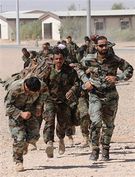 Gordon Brown says Britain must not walk away from NATO’s Afghan mission. Yet 73 percent of Britons told YouGov that they want British troops withdrawn. Even more probably think they will fail even if they are allowed to stay on.
Gordon Brown says Britain must not walk away from NATO’s Afghan mission. Yet 73 percent of Britons told YouGov that they want British troops withdrawn. Even more probably think they will fail even if they are allowed to stay on.
Yet what to do if you believe, like I do, that the allies cannot simply withdraw without creating a catalytic effect on worldwide Islamist extremism and a regional vortex of violence, which will end in sectarian strife, refugee flows, President Karzai’s toppling, Pakistan’s further destabilisation and irreparable damage to NATO?
One last heave, won’t do. Clever initiative, like my own idea of creating an ANA Army Corps of Engineers, will take too long to make an impact. With Richard Holbrooke sidelined, Kai Eide seen by many as discredited, and Stanley McChrystal powerless to influence his boss, making Hamid Karzai to do anything different, let alone take on corruption, will be tough.
President Karzai is like the scorpion who hitches a ride on the tortoise’ back in Aesops’s fable. Though everyone will drown if he misbehaves, he cannot but condone corruption — it is in his nature, in the nature of the way he has and must govern to survive. So expect little real change.
In developing a new strategy, three things have to be acknowledged. First, what started out as insurgency has turned into an insurrection, which may be spearheaded by Mullah Omar’s Taliban, but has now drawn a range of powerbrokers and criminals into its loosely organised ranks. Second, the insurgency draws its strength and cohesion in part from fighting outsiders whether they are kufir, unbelievers, like NATO’s soldiers or President Karzai’s rapacious henchmen. Sure, ideology plays a role. So does money, which is used to rent insurgents. But the us-against-them narrative is a unifying glue.
And third, that there is no amount of fighting reconstruction, or development that can change Facts No 1 and 2, even if US and British experts were allowed outside their heavily-fortified bases for sufficient time to “build” after the military “clears” an area.
The answer has to be political, not military or developmental. That means creating some kind of political project, which can suck some energy out of the insurgency’s quasi-nationalist argument. This is not the same as decentralisation. No amount of Swiss-style delegation of authority from the centre to the provinces will do. To many locals, this only means giving ceding more power to President Karzai’s cronies.
Nor does it mean improving the performance of provincial and district governments. That is a task beyond 24-year old lieutenants, however bright and committed. I spent years in Bosnia and tried to master the language – and even then often struggled to understand the local politics. I knew even less when I arrived in Iraq, but had at least some freedom of movement. Diplomats and soldiers in Helmand, however, have none of the time, language skills, freedom of manoeuvre and cultural know-how to understand, let alone improve, the province’s byzantine administration.
There is only one real alternative: a dramatic, eye-popping devolution of power to a Pashtun political entity in the south which can take in Kandahar, Helmand and Oruzgan provinces. Such an entity may, at least for a time, rob the insurgency of its quasi-nationalist narrative. Created in a process of constitutional reform, such an entity can hold its own Loya Jirga and select or elect a leader, who can command the loyalty of the Pashtun tribes.
Rather than look to make the Kabul government’s “reach out to the provinces”, as has been international policy for five years, such an entity can receive funding and technical capacity directly from donors and formally develop the kind of confederate relationship with the central government that is more in keeping with the country’s traditions. It can also be allowed to raise a security force, which will be connected to the ANA, but like British regiments, be distinct.
There are many reasons why not to go down this route. But it is time for bold policies if keeping British soldiers in situ for much longer is to pay off.






Comments